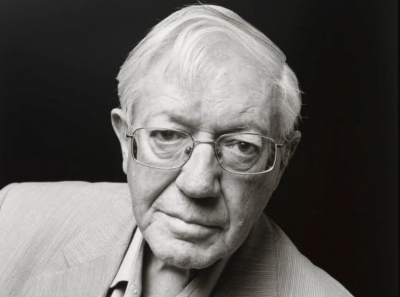Archive
'The National Gallery of Victoria – A New Partnership with ABR' by Dr Isobel Crombie
This issue marks the start of a new feature for ABR, with covers reproducing some of the finest Australian photographs held by The National Gallery of Victoria (NGV). ABR is a journal that critically engages with a broad range of creativity, so it seems fitting that it should also highlight photography, a medium that is not only one of the leading art forms of the modern era but also an area in which Australian artists consistently excel.
... (read more)Early on, my mind was in reverse.
I read a book the name I thought was From
White Cabin to Log House, and ever after
I knew ambition must go to cancrizans.
My Name is Will Thompson by Robert Newton & Camel Face by Moya Simons
To dinner as a guest at the Lotos Club, on East 66th St in New York. Named apparently after Tennyson’s Lotos Eaters’ territory – ‘In the afternoon they came unto a land in which it seemed always afternoon’, not to be confused with Robert Burton’s ‘afternoon men’, who are permanently smashed. The Latos Club’s 1870 Constitution declares its intent to promote and develop literature, art, sculpture and much else. One thing caught my ear, and one my eye. It was the first time I have heard anybody speak in virtually the same breath of ‘my ancestors’ and ‘residuals’. And I was glad to see that the Club boasted yet another painting of Tom Wolfe in (so to speak) full fig, white on white – glad partly because it reminded me that of all the worthy injunctions offered me as a young Jesuit, that against becoming a ‘clerical fop’ has been obeyed triumphantly. One has to start somewhere …
... (read more)The Frank Hardy I Knew
Dear Editor,
Frank Hardy was a larrikin. It was probably one of his most endearing qualities, but he did tell me once that his membership of the Australian Communist Party enabled him to become something more than a larrikin. He didn’t always pay his debts, except for the one big debt and the only one worth remembering: the debt of living, to the end, a writer’s life. For a boy brought up amongst working-class Irish Catholics in the potato belt in Victoria, that was no mean feat.
... (read more)The second Adelaide Festival of Ideas will happen in mid-July. Local participants will include Tim Flannery, Raimond Gaita, Marcia Langton, and Ronald Wilson, and, from overseas, John D. Barrow and Vandana Shiva. The advertised themes are water, population, reconciliation, addiction/intoxication, and cosmology – something for everyone.
The Australian/Vogel Literary Award, now in its twenty-first year, is on again. Entries must be lodged by the end of May. You don’t have to be twenty-one to enter – just under thirty-five. Winners are guaranteed publication by Allen & Unwin, and a cheque for $20,000.
... (read more)






